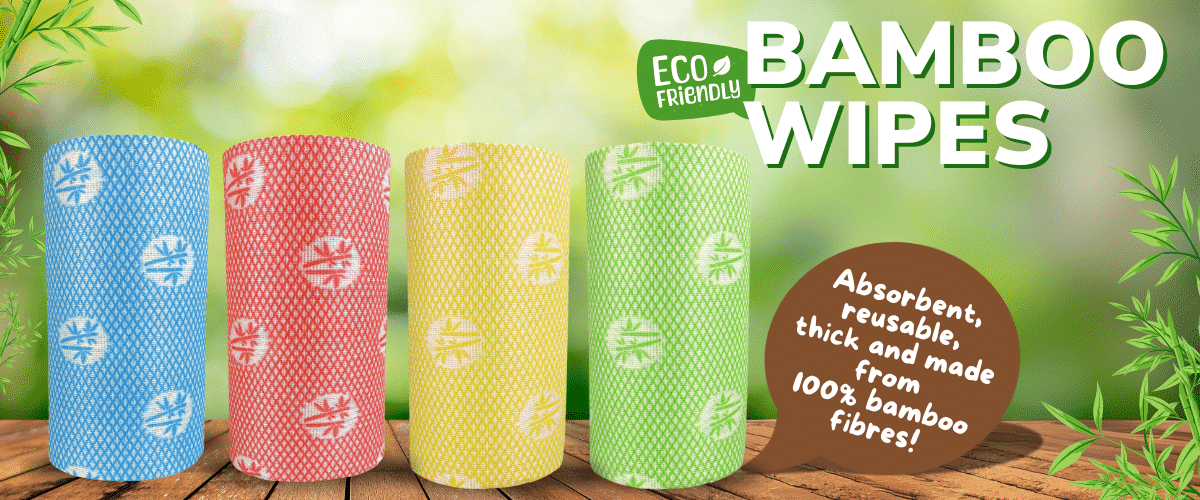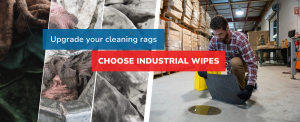Bamboo Wipes: Are They Really Biodegradable? Find Out Here

This informational post provides key insights about what EcoStrong Bamboo Wipes are made of and how they decompose much faster than traditional synthetic blended wipes and cloth alternatives. If you are a commercial organization or a business owner, it’s worth taking a moment to understand what bamboo cleaning wipes are, whether they are truly biodegradable, why you should care, and specifically, are bamboo wipes biodegradable?
Why the Biodegradability of Cleaning Products Matter
Our everyday products significantly impact our planet in the era of much-needed eco-conscious awareness. Cleaning products, in particular, contribute significantly to waste. Biodegradable wipes, which break down naturally without harming the environment, offer a solution to reduce this waste. Businesses can become part of the solution without compromising quality or cost, leading to a cleaner, greener future.
We are big fans of these wipes and started using them at the TIDDOX warehouses out of the need for sustainable cleaning practices. We became users first, and after months of using and testing these wipes, we added them to our eco-friendly product line. They’ve been a great success and have proven to be one of our most popular lines with our corporate customers, especially those in the hospitality, healthcare, and commercial cleaning sectors looking to meet their own sustainability goals.
The feedback has been excellent. Most comments focus on the effective performance of these heavy-duty commercial bamboo cleaning wipes, particularly in terms of absorbency and durability. TIDDOX now sells and distributes them throughout Australia and through our online shop.
Understanding the Meaning of Biodegradability
Most of us are familiar with the term “biodegradable,” but what does it mean, exactly? Let’s delve into the composition of bamboo wipes, their decomposition process, and their environmental impact compared to traditional synthetic blended wipes.
What Does It Mean for a Product to be Biodegradable?
The term “biodegradable” refers to a product’s ability to decompose naturally in the environment through the actions of microorganisms, typically within a reasonable timeframe. The closer a product is to its natural, unprocessed state, the more readily it will break down in the environment.
Through this process, the substance breaks down into simpler components like water, carbon dioxide, and biomass without leaving behind harmful residues. This is, for example, why plastics are not biodegradable.
Why Biodegradable Products Are Important for the Environment
Unlike conventional products that can persist in landfills and oceans for centuries, biodegradable items break down relatively quickly, minimizing their ecological footprint. By selecting materials that decompose naturally, we can significantly reduce our environmental footprint and promote a healthier planet for future generations.
Biodegradable vs Compostable
While all compostable materials are biodegradable, not all biodegradable materials are compostable. Below are the key distinctions that separate the two.
Characteristics of Biodegradable Products
- Materials can be broken down by natural biological processes (bacteria, fungi, etc.) over time.
- Materials degrade into natural elements like carbon dioxide, water, and biomass.
- Timelines can vary greatly, from months to decades to centuries.
- Not all biodegradable waste materials will fully decompose in a landfill environment.
Characteristics of Compostable Products
- A subset of biodegradable materials can be broken down in a composting environment.
- Specific conditions like heat, moisture, and oxygen are required to achieve decomposition.
- Materials break down into nutrient-rich organic matter within 90 days in a commercial composting facility.
- Compostable products do not leave behind any toxic residues.

What are Bamboo Cleaning Wipes?
Bamboo cleaning wipes are an eco-friendly alternative to those traditional wipes that contain synthetic materials. Because these sustainable wipes are made from 100% natural bamboo fibres, they not only offer enhanced absorbency and effective cleaning but also promote environmental sustainability.
1. Composition: Materials Used in Bamboo Cleaning Wipes
Bamboo cleaning wipes are primarily made from bamboo fibres. These fibres are derived from the fast-growing bamboo plant, known for its sustainability. Bamboo wipes have natural additives and antibacterial properties that enhance their cleaning properties.
2. Manufacturing Process: How Bamboo Wipes are Made
The manufacturing process begins with harvesting bamboo, which is then processed to extract the fibres. These fibres are cleaned, spun into threads, and woven into fabric. The fabric is then cut into wipes, packaged, and distributed.
3. Manufacturer Highlights: Common Environmental Benefits
Manufacturers often highlight that bamboo cleaning wipes are biodegradable and compostable, breaking down quickly in natural environments. They also claim that bamboo cultivation requires less water and no pesticides, making it a more sustainable choice. Additionally, bamboo wipes are promoted as being free from harmful chemicals, ensuring a safer option for both users and the environment.
How Biodegradable Are Bamboo Wipes Truly?
Bamboo wipes are highly biodegradable. Contrary to popular belief, bamboo is not a type of wood but rather a grass material, making it a natural biodegradable material that can be broken down in as little as six months. These environmentally friendly benefits align with the sustainability goals of many businesses looking to move away from synthetic, non-biodegradable consumables to ones made with natural, biodegradable materials.
How it Benefits Your Business
Using eco-conscious wipes benefits your business by enhancing sustainability compared to traditional synthetic blended wipes and cloths. They are especially useful in hospitality, healthcare, and commercial cleaning, where their reduced environmental impact and cost-effectiveness help organizations do the right thing for the planet while maintaining high cleanliness standards.
Industries Embracing Bamboo Wipes
In the hospitality industry, hotels, restaurants, bars, and cafes are shifting away from synthetic blended wipes to bamboo wipes. These wipes look and feel the same as traditional wipes but offer greater absorbency and better environmental compatibility. This trend is also evident in healthcare, where sustainable wipes are used with sanitizing solutions for surface disinfection and medical equipment cleaning. This practice ensures a hygienic and safe environment in hospitals, aged care facilities, and medical centres.
Commercial cleaners face increasing pressure from corporate customers to use bamboo wipes to meet sustainability targets. As a result, more organizations are embracing this change, using these wipes for dusting, wiping counters, and keeping workspaces clean. By switching to bamboo wipes, businesses can improve their ecological footprint while maintaining high cleanliness and efficiency standards. Ultimately, it’s the right thing to do.
Let’s Use Bamboo Wipes for a Greener Future
Ultimately, bamboo wipes represent a greener future, offering a practical and eco-friendly alternative to business organizations. Their rapid biodegradability and minimal environmental impact exemplify the quality-driven, innovative approach that today’s eco-conscious organizations seek.
For more information on biodegradable cleaning wipes, visit the TIDDOX Product Page.
Share This Post
More To Explore

TIDDOX Cleanroom Wipes – High-Performance Wiping Solutions for Critical Environments
At TIDDOX, we supply premium-grade cleanroom wipes for industries that require strict contamination control. Our selection includes sterile and non-sterile

Industrial Cleaning Wipes as an Alternative to Rags
Industrial cleaning wipes are an effective alternative to cleaning rags, offering many benefits. Unlike rags, which are recycled from used



